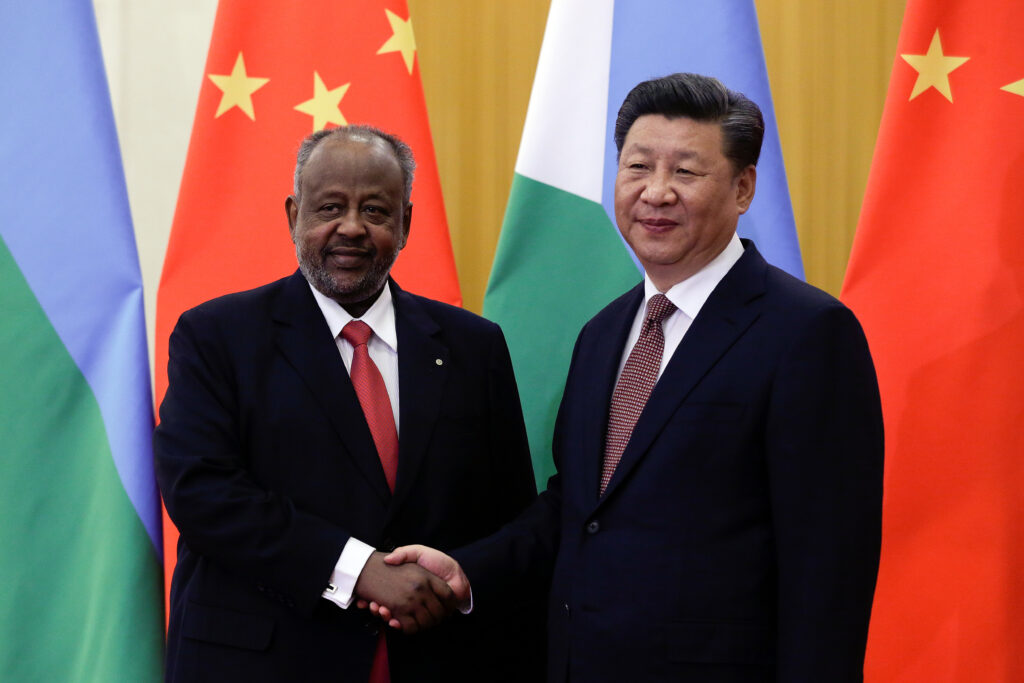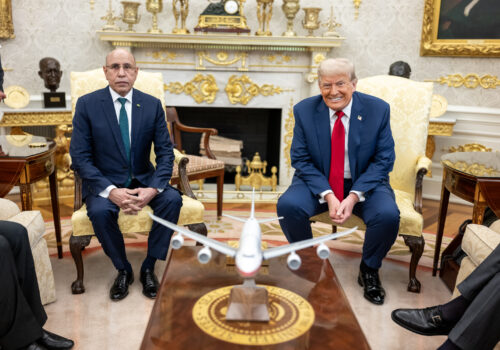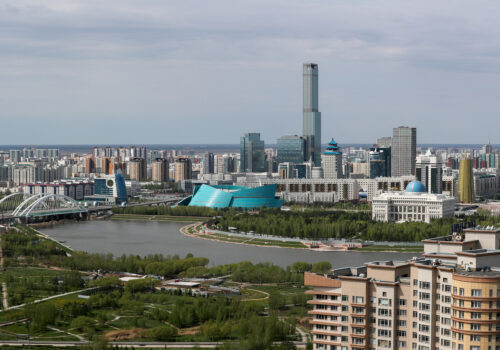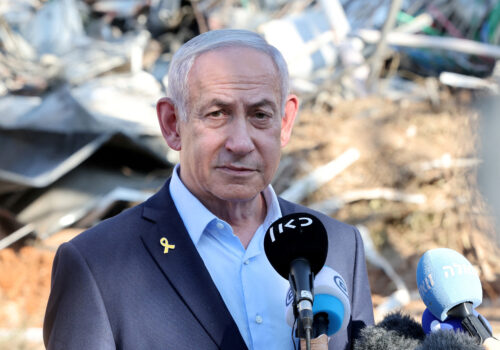As China rapidly expands its footprint along the Red Sea, one small African nation constitutes an important focal point in great power competition.
Despite only being about the size of the state of New Jersey, Djibouti hosts at least eight foreign military bases, including ones from the United States, Japan, and France. This can largely be explained by Djibouti’s strategic location along the Bab el-Mandeb Strait, a vital maritime channel where an estimated 10 to 12 percent of global trade passes through every year.
China has also been expanding its military presence in the country in recent years. Beijing established its first overseas military base in Djibouti in 2017. Although the Chinese government insists this facility is for logistics, international observers have long called this into question, making its location a mere seven miles from US Camp Lemonnier concerning. Since then, the Chinese and Djiboutian military have undergone joint military exercises, and Chinese state-owned companies like the China Merchants Group have significantly expanded their footprint in the country to include an ownership stake and involvement in the day-to-day operations of the Doraleh Multipurpose Port. The two pronged economic and military strategy has afforded Beijing significant influence in the country, enough that the Chinese government asked the Djiboutian government not to allow US planes to fly too low over its naval base.
Yet this level of influence is part of a much broader Chinese strategy. Across the Red Sea corridor, China is investing billions of dollars into port facilities, railways, factories, and other projects in countries that border the strategic waterway. In just one example, China maintains a stake in the running of ports in Egypt and Egypt’s Suez Canal Economic Zone (SCEZ) and China’s state-owned China Energy Engineering Corporation (CEEC) signed a $6.75 billion deal last year to develop green ammonia and green hydrogen projects.
This raises a critical question: How can the United States maintain and strengthen its influence in Djibouti when China is bringing so much to the table?
Strategic rationale and challenges for a “triangle of influence”
One potential answer lies in forging a triangle of influence—a coordinated, interest-driven partnership among the United States, United Arab Emirates (UAE), and Israel that leverages the shared strategic interests between UAE, Israel, and Djibouti.
While the United States has a long-standing relationship with the Djiboutian government, US engagement pales in comparison to the level of Chinese government activity, and there is a risk that the US posture in Djibouti—and its strategic security interests—could erode further as the Chinese-Djiboutian relationship grows.
For instance, last year US trade with Djibouti totaled $185.1 million, $145 million of that being solely US imports to the country. That same year, China-Djibouti trade reached $3.06 billion. Adding to that, US troops stationed at Camp Lemonnier require special permission to leave the base, and even then are not permitted to go to much of the capital, giving them extremely limited interactions with the local population. That situation comes despite Djibouti having not suffered a major terrorist attack since one claimed by al-Shabaab in 2014, and carrying the same US State Department travel advisory as countries like France, Germany, and Spain. On the other hand, Chinese troops have less restrictions when it comes to leaving their base and are able to frequent local businesses, they also contribute to a number of public diplomacy initiatives like multinational basketball tournaments.
SIGN UP FOR THIS WEEK IN THE MIDEAST NEWSLETTER
With the help of some of its closest allies in the Middle East, the United States could significantly upgrade its relationship with Djibouti and effectively secure its foothold along some of the world’s most important waterways.
Washington’s close ally, the UAE, had significant interest in investing in Djibouti in the past, given Djibouti’s strategic location along a critical maritime route and the UAE’s focus on maritime security and development. Its own DP World built the now Chinese-operated Doraleh Container Terminal in 2009, which quickly became a major revenue source and employer in the country. DP World continued to operate the port until 2018, when the Djiboutian government terminated the contract under claims that it compromised national sovereignty. Despite international courts ruling in favor of DP World, the government has refused to pay the $385 million in fines. Similarly, DP World has another standing dispute with the government over a free trade zone in the same area that they developed but is being operated by China Merchants Group. Moreover, the UAE’s partnership with Eritrea—including its past use of the port of Assab during the Yemen conflict—has complicated relations with Djibouti, given the longstanding border dispute and deep mistrust between the two Horn of Africa neighbors.
Bringing Israel into this emerging network makes strategic sense. Israel and Djibouti have a shared interest in safeguarding Red Sea shipping lanes from threats like piracy, terrorism, and Iranian-backed militant activity. Israel’s growing role in Red Sea security—evident in its first naval strike on the Houthis and participation in US-led naval exercises—positions it as a capable contributor to maritime stability. Moreover, integrating Djibouti into a broader, regional framework alongside like-minded regional partners could make decoupling from Beijing a reality, and provide Djibouti with access to cutting-edge technology, defense coordination, and resilient infrastructure development.
However, another major roadblock lies in the Djiboutian government’s willingness to cooperate with Israel given current tensions in the region.
There were reports that Djibouti was exploring cooperation with Israel before the October 7, 2023, Hamas attacks that launched the war in Gaza. But since then, President Ismail Omar Guellah has consistently signaled that normalization with Israel is off the table—for now. In the months following October 7 and Israel’s ensuing campaign against Gaza, Djiboutian Foreign Minister Mahmoud Ali Youssouf stated that he voted against Israel’s observer status at the African Union and linked normalization with Israel to a just resolution for Palestinians.
With both those factors in mind, meaningful trilateral cooperation with Israel and the UAE would require either a major shift in the regional environment or a change within Djibouti’s government. Political change in Djibouti does not appear imminent: Despite a constitutional ban on presidential candidates over the age of seventy-five, the president, who has been in power since 1999, has hinted that he will run for a sixth term in the April 2026 election.
However, the United States can take steps now to lay the groundwork for such a partnership by deepening bilateral ties with Djibouti and building political and economic trust that could pave the way for future multilateral cooperation.
Laying the groundwork for new partnerships
First, the United States should look to scale up both large and small-scale economic engagement in Djibouti in areas that provide direct benefits to the Djiboutian people and doesn’t just serve strategic military interests. Through its Development Finance Corporation (DFC) and by incentivizing private investors, the US should fund key projects in areas like digital networks, renewable energy, and transportation corridors. At the same time, the United States should prioritize importing locally made products—like Coca Cola products produced in Djibouti—to Camp Lemonnier and allow US forces permission to leave the base and contribute to the local economy, improving the Djiboutian population’s view of the United States.
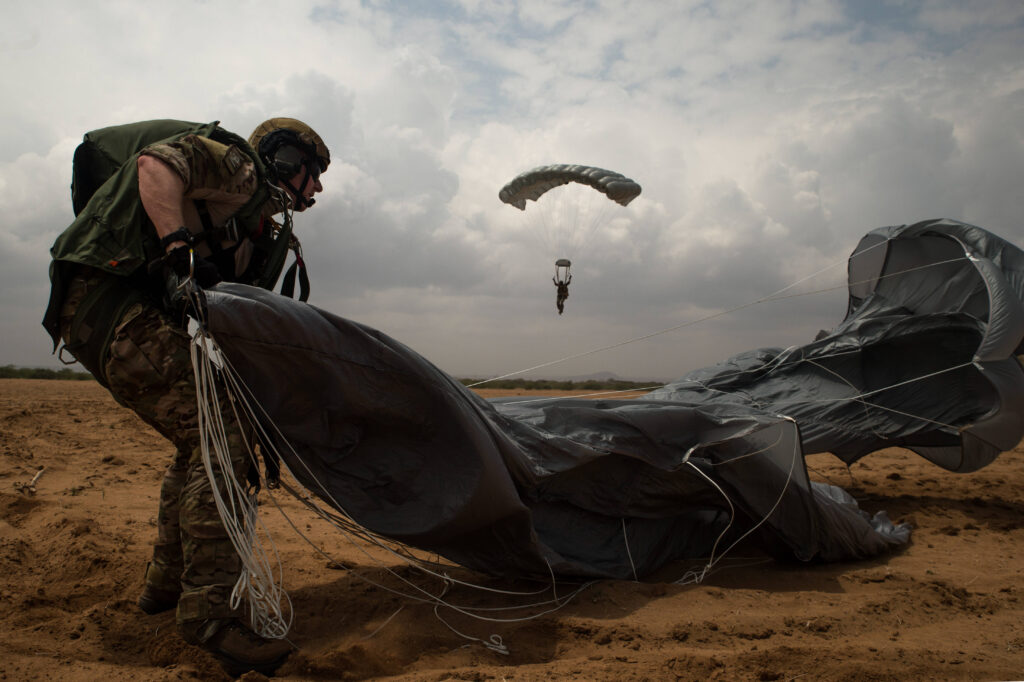
Signs suggest that the Djiboutian government is seeking to repair its reputation and attract more diverse foreign investment. The Djiboutian government set a goal to double the size of its sovereign wealth fund in an effort to diversify Djibouti’s economy and modernize its banking sector and added new Western banks. Additionally, Guellah explicitly invited foreign investors to the country’s first Djibouti Forum, held in May of last year, where they highlighted Djibouti as a new “hotspot” for investment.
Second, US President Donald Trump’s administration should leverage the Emiratis’ continued interest in shaping Red Sea trade networks to bring them back to the table with the Djiboutians. While past tensions remain unresolved, frank discussion between these leaders can begin to rebuild trust and potentially reignite investment opportunities, especially if done with US guarantees or incentives that lower the risk for Abu Dhabi.
Third, Washington should begin to introduce Israel’s technological and security expertise, particularly in areas like water management, agriculture, and surveillance, to the Djiboutian government through multi-lateral formats or UAE-led ventures. Further backchannel cooperation with US backing could lay the foundation for future openness to normalizing relations with Israel while respecting Djibouti’s view of the current situation in the region.
Finally, the United States must recognize the transactional nature of Djibouti’s foreign policy and engage the government consistently and with strategic clarity. The Trump administration must recognize that the country will not pivot away from China overnight—that will require sustained effort from the United States and partners in the region.
While Beijing continues to expand its foothold along the Red Sea, the United States still has an opportunity to secure its relationship with Djibouti.
Emily Milliken is the associate director for the N7 Initiative, a partnership between the Atlantic Council and Jeffrey M. Talpins Foundation.
Further reading
Wed, Jul 16, 2025
How Mauritania-Israel normalization may boost US posture in the Sahel
MENASource By Sarah Zaaimi
If Mauritania is nearing a deal with Israel, this could be the beginning of a wider re-engagement with Sahel countries.
Mon, May 12, 2025
Azerbaijan and Kazakhstan are the Abraham Accords’ new frontier
MENASource By
Joining the Accords could benefit Baku and Astana, while also helping Israel and the US strengthen engagement with the Turkic world.
Mon, Jul 7, 2025
Opportunity knocks on Netanyahu’s US visit after Israel-Iran war
MENASource By Shalom Lipner
Prevailing circumstances—albeit fraught with barriers—present the opportunity for all sides to declare victory.
Image: Djibouti's President Ismail Omar Guelleh and China's President Xi Jinping shake hands before their bilateral meeting at the Great Hall of the People in Beijing, China September 2, 2018. Andy Wong/Pool via REUTERS
